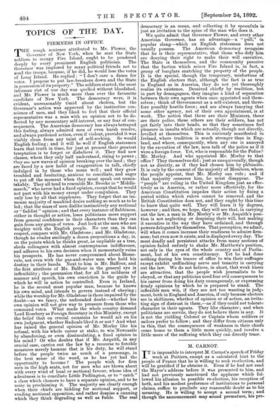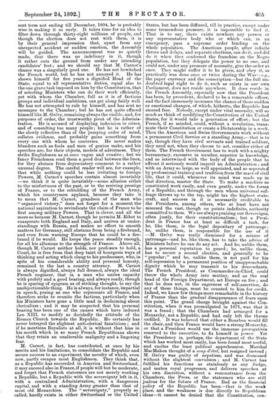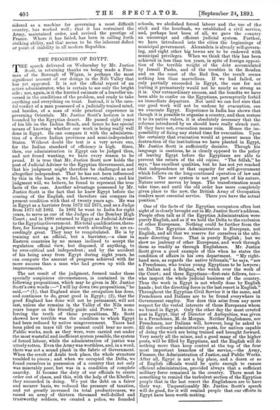M. CARNOT.
IT is impossible to interpret M. Carnot's speech of Friday week at Poitiers, except as a calculated hint to the people of France that he is willing to seek re-election, and will be gratified if he obtains it. Even if he had not read the Mayor's address before it was presented to him, and had not previously sanctioned the applause which fol- lowed his allusion to possible re-election, his reception of both, and his modest preference of institutions to personal claims, suffice to preclude any reasonable doubt as to his meaning. He is willing to accept a second term ; and though the announcement may sound premature, his pre- sent term not ending till December, 1894, he is probably wise in making it so early. It takes time for an idea to filter down through thirty-eight millions of people, and though the election does not rest with them, it is by their general impression that, apart from any unexpected accident or sudden emotion, the Assembly will be guided. The announcement was so quietly made, that there was no indelicacy in it, though it rather cuts the ground from under any intending candidates' feet ; and we should say that M. Carnot's chance was a singularly good one. He has not bewitched the French world, but he has not annoyed it. He has shown himself for five years a dignified Head of the State, equal to all representative duties, equal also to the one grave task imposed on him by the Constitution, that of selecting Ministers who can do their work efficiently, yet with whom the Chamber, full as it is of factious groups and individual ambitions, can get along fairly well. He has not attempted to rule by himself, and has sent no messages to the Chamber ; but he has not quite effaced himself like M. Gravy, remaining always the visible, and, for purposes of order, the trustworthy pivot of the Adminis- tration. He is accused of displaying indecision in crises, and of consulting too many people ; but he is rather of the slowly reflective than of the jumping order of mind, collates evidence, and probably gains something from every one with whom he converses. He never makes blunders such as fools and men of genius make, and his speeches are, for their objects, models of adroitness. They strike Englishmen as at once vague and evasive ; but we fancy Frenchmen read them a good deal between the lines, for they abstain from depreciatory comment to a rather unusual degree. The careful reader will see, for example, that while nothing could be less irritating to foreign Powers, M. Carnot's speeches contain almost invariably —we think it is quite invariably—some allusion either to the misfortunes of the past, or to the reviving prestige of France, or to the rebuilding of the French Army, which his countrymen applaud, because they take it to mean that M. Carnot, grandson of the man who " organised victory," does not forget for a moment the national aspiration to revindicate the claim of France to be first among military Powers. That is clever, and all the more so because M. Carnot, though he permits M. Ribot to exasperate both England and Italy, and arrives at under- standings with Russia, and makes no effort to smooth matters for Germany, still abstains from being a firebrand, and even from warning Europe that he could be a fire- brand. if he would. He keeps the peace steadily enough, for all his allusions to the strength of France. Above all, though M. Carnot neither holds, nor professes to hold, a Court, he is free from that deep taint of bourgeois ways of thinking and acting which clung to his predecessor, who, in spite of his considerable ability and personal honesty, remained to the last a country attorney. M. Carnot is always dignified, always full dressed, always the ideal French engineer, that is, a man who unites capacity with probity and a good bearing, and always ready, though he is sparing of epigram as of striking thought, to say the unobjectionable thing. He is always, for instance, impartial in speech, posing as one who represents all France, and therefore seeks to reunite the factions, particularly when his Ministers have gone a little mad in declaiming about clericalism ; and it may be suspected that his personal bearing has been one of the causes which have induced Leo XIII. to modify so decidedly the attitude of the Roman Church towards the Republic. He certainly has never betrayed the slightest anti-clerical fanaticism ; and if he mentions Royalists at all, it is without that hiss in his mouth which in so many French Republicans shows that they retain an unalterable malignity and a lingering fear.
M. Carnot, in fact, has contributed, at once by his merits and his limitations, to consolidate the Republic and secure success to an experiment the novelty of which, even now, partly escapes most Englishmen. They think that, as a Republic has succeeded in America and Switzerland, it may succeed also in France,if people will but be moderate, and forget that French statesmen are not merely working a Republic, but a Republic with the sovereignty left in it, with a centralised Administration, with a dangerous capital, and with a standing Army greater than that of most old Monarchies. The " sovereignty," properly so called, hardly exists in either Switzerland or the United States, but has been diffused, till in practice, except under some tremendous pressure, it is impossible to find it. That is to say, there exists nowhere any person or any representative body who or which can, in an emergency, pass a supreme order binding on the whole population. The American people, after infinite throes and delays, and separate elections, can do it, and did do it when they conferred the franchise on the Negro population, but they delegate the power to no one, and could not., under any pressure of necessity, give the order at once. They might suffer it to be given, and obey it, as practically was done once or twice during the War—e.g., the paper currency and the conscription—but the full un- doubted legal right to do it, such as exists in our own Parliament, does not reside anywhere. It does reside in the French Assembly, especially now that the President has been, by precedent, declared to be a removable officer, and the fact immensely increases the chance of those sudden or emotional changes, of which, hitherto, the Republic has steered free. Nobody, except under vital necessity, will so much as think of modifying the Constitution of the United States, for it would take a generation of effort ; but the French, if so minded, could, without a revolution, trans- mute their Constitution or create a Dictatorship in a week. Then the American and Swiss Governments work without a permanent Civil Service or a standing Army,—that is to say, though they have civil servants and trained soldiers, they need not, when they choose to act, consider either of them. The French Government has to work with a mighty bureaucracy, excessive in number, superior in knowledge, and so intertwined with the body of the people that to affront it seriously would imperil an Administration ; and with an Army so large, so well appointed, and so separat€d by professional training and tradition from the mass of civil life, that it could, whenever its mind was made up in that direction, master the State. To make a machine so constituted work easily, and even gently, under the forms of a Republic, and through the men whom universal suf- frage throws up to the top, might tax the highest state- craft, and success in it is necessarily creditable to the Presidents, among others, who at least have not misused the vast, though on points indefinite, authority committed to them. We are always praising our Sovereigns, often justly, for their constitutionalism ; but a Presi- dent in France has at least as difficult a task, for he, like them, is the legal depositary of patronage ; he, unlike them, is responsible for the use of it —M. Gravy was really dismissed for a misuse of patronage—and he, like them, has to take the advice of Ministers before he can do any act. And he, unlike them, has a personal reputation to guard ; he, unlike them, has to secure a second election, and generally to be " popular ;" and he, unlike them, is not paid for his self-repression by a permanent position of unapproachable dignity which he may transmit to his descendants. The French President, as Commander-in-Chief, could throw the whole Army into mutiny, and as the real head of the Foreign Department, set Europe on fire ; and that he does not, in the eagerness of self-assertion, do any of these things, must be counted to him for credit. Indeed, we know few things more remarkable in the history of France than the gradual disappearance of fears upon this point. The grand charge brought against the Con- stitution, when it was promulgated in 1871, was that it was a fraud ; that the Chambers had arranged for a Monarchy, not a Republic, and had only left the throne unfilled. It was believed that either a Bourbon would fill the chair, and then France would have a strong Monarchy, or that a President would use the immense prerogatives reserved to the executive, to fix himself in power. Yet the Presidency is, perhaps, the department of the State which has worked most easily, has been found most useful, and excites the least political apprehension. Marshal MacMahon thought of a coup d'etat, but resigned instead ; M. Gravy was guilty of nepotism, and was dismissed without the slightest convulsion ; and M. Carnot has fulfilled his functions as stainlessly as any Judge, and makes royal progresses, and delivers speeches at his own discretion, without a remonstrance from the Chambers, the Press, or the statesmen who are still jealous for the future of France. Bad as the financial policy of the Republic has been—that is the weak place, and the weakness is due directly to Republican ideas—it cannot be denied that the Constitution, con- sidered as a machine for governing a most difficult country, has worked well ; that it has restrained the Army, maintained order, and revived the prestige of France. Where it has failed, has been in calling forth striking ability, and that seems to be the inherent defect or point of inability in all modern Republics.




































 Previous page
Previous page